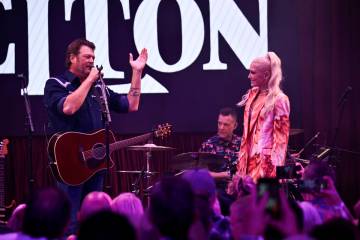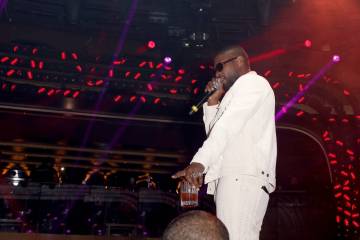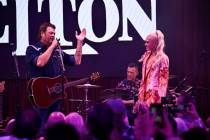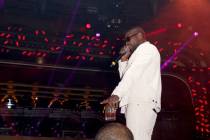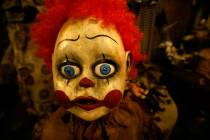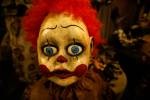‘Tinfoil Haberdashery’ hampers disbelief
According to playwright Ernest Hemmings, his "Tinfoil Haberdashery," the Test Market Theater Group production now playing in the Las Vegas Little Theatre Studio, is a pitch-black comedy.
This original script is part tribute to Igor Soldo and Alyn Beck, the two Las Vegas policemen who were gunned down, execution-style, while lunching at a pizzeria on June 8, 2014. But it's also a narrative on how we hide in what we think (wish?) to believe is the anonymity of the Internet via social media, bulletin boards and forums where we can become whomever we want.
Chuck (Brandon McClenahan) has presented himself in the persona of conspiracy theorist. McClenahan gleefully feeds encouragement to the underbelly of the anti-government realm, those who feel disenfranchised, angry and want to fight the good fight of the inevitable revolution. He states his arguments with the earnestness of a child.
His roommate Kyle, played by Shane Cullum, delivers the counterpoint. Cullum, who spends almost the entirety of the play in undershirt and tighty-whities, brings a proper sadness to the guy who follows the rules and scoffs at the "verbal diarrhea" of the online crazies and those who sometimes get caught up in the guilt-by-association frenzy. Cullum makes his case with matched sincerity.
The ramifications of Chuck's behavior are wrought in the appearance of Phillips, played with sweetness and light by Joel Wayman, who fairly steals the show as he morphs from overly kind to condescending to downright scary-mean.
And here we get to the crux of Hemmings' play. As things disintegrate, Chuck and Kyle switch sides and Phillips gets the last laugh. But the script has some big holes in it — or at least from a staging standpoint as directed by Hemmings — because we're unable to suspend our disbelief.
It's not the acting choices that hurt the production because the three men are very capable actors, they all play their characters with the fervor and honesty of what's been provided by the author, and they utilize their instruments; guts tighten, jaws clench, vocal cords waver.
All that makes us want to believe. But we're expected to look past or ignore the multiple opportunities Chuck has to escape, to fight, to overcome. When Phillips is focused on the now-believing and belligerent Kyle and, most notably, with the scripted thinness of the walls of the house, the action and some of the dialogue don't make sense.
The comedy comes in tiny spurts and what feels lacking is a foil for the role of Phillips — there's no one onstage to play off the majority of his repartee, which is what makes a black comedy work. A script cannot rely on the audience to fill in missing dialogue or physical reactions. As the master of black comedy, Quentin Tarantino gives us teams, characters who appreciate the dark humor to let us in on the jokes, such as Vincent and Jules in "Pulp Fiction."
The Studio is the perfect venue for testing this type of a play. The staging area is small and the barest of equipment is in place to put a play on its feet, to find out what works and what doesn't.
Unless it's a tech-heavy show, those things are not found in the set, lights or costumes, but discovered through staging, the seeing and hearing of the dialogue and action.




